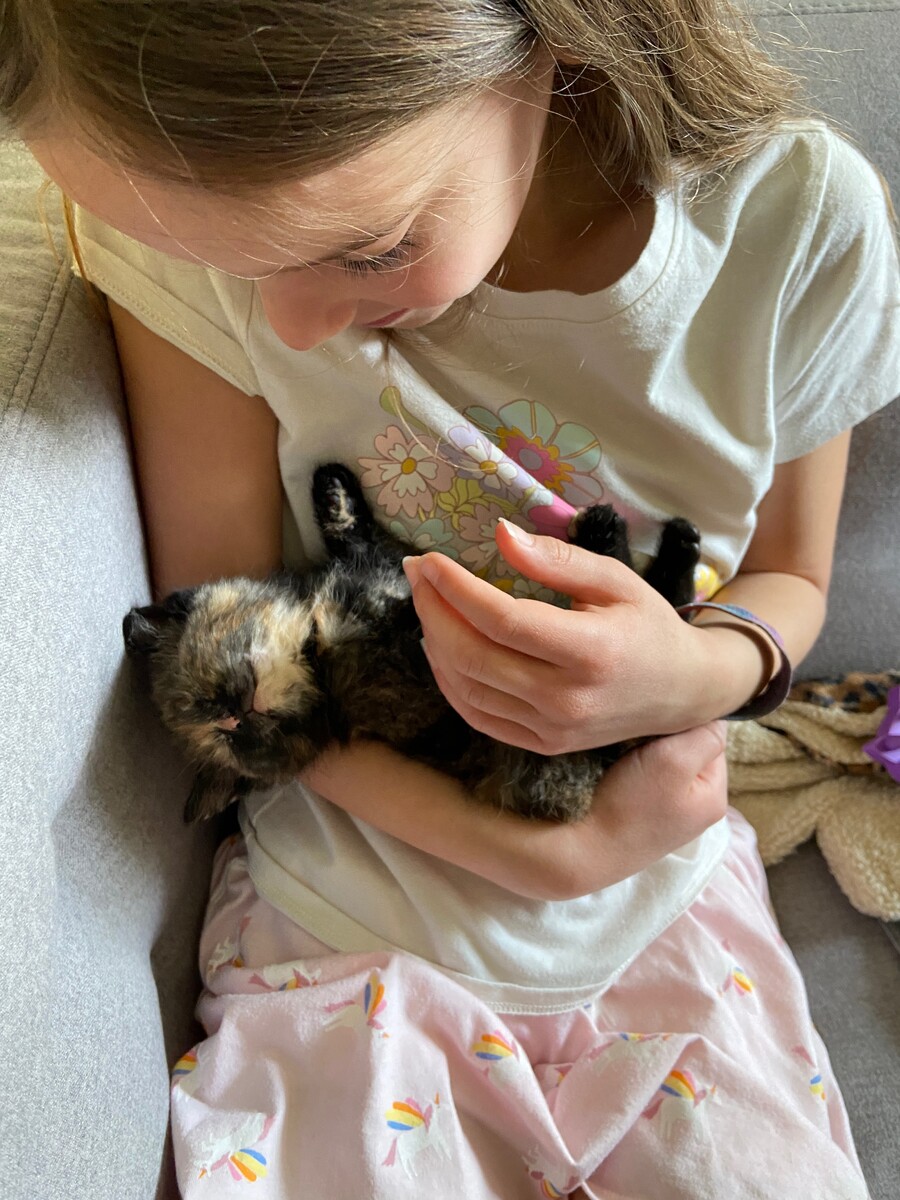Gooseberry after a Storm


“Dada, the frog’s legs are stretched out really far! Is it OK?”
Ess and I were out in the yard, picking up birch sticks, enjoying that kind of convivial togetherness in doing a common chore. We weren’t playing a game, or pretending the sticks were giantess hair, or trying to wring anything in particular out of the moment: just being in the same place, in parallel.
So I wasn’t paying much attention when Ess went to check on a frog. A particular frog, one she had named Melissa Doug “Missy D” Frogchair. A frog that lived in the well next to our house, three feet below grade, outside our basement egress window. A frog we all met early in the summer, after an unseasonably warm June day when Mykala found it and thought it might be growing desiccated. She sprayed some water down over Missy D Frogchair, a gentle “rain” from the June sky, and Mx Frogchair turned and stared at her for a long long time, stretching its neck to catch every drop.
Shortly thereafter, we found a shallow broad container, filled it with water, and set it next to Missy D. After a few days, they decided the water was safe and spent their time mostly submerged in it. Some days we’d go in the basement and check on Missy D through the window, and sometimes we’d find them staring directly at us. We wondered what they saw.
What do you do with a nice frog, one happy in shade, in water? One who has, presumably, plentiful food from the buggy night air? One far away from any animal that might eat it? How do you protect something wild, but still let it be wild? We decided not to intervene: after all, Missy D had grown to be a good adult size, so whatever path they were on did not seem to need human intervention.
And so I responded to Ess on our stick-chore day: “Oh, I’m sure the frog is just fine!” Reflexive, that response of mine. Like I can’t bear the pain of things not being okay, so I’m going to just force them into a box labelled “OK”. I should stop doing that. Was I convinced Missy D was fine, or desperately needing it to be so? I don’t know. Both?
But you know where this is going. I peeked over the ledge of the window well and whatever instinct I have left in my techno-addled brain told me two things: (1) Missy D had died and (2) it was time to bury them.
Ess took the news better than Mykala and myself, I think because dominant ego at her young age obscures much: it convinces a person these cycles of life and death run separate from You. You are the watcher and observer, and perhaps the thing is sad, but you are set apart from it. You move through the world, as if in a dream, working to meet your needs on your timetable for You. And then, as you grow older, if you work on it, you are humbled by the connections between every one and every thing and every event. How we’re just here by weird cosmic luck. How our ability to think about thinking (about this right here, right now!) is another weird universal quirk. How it isn’t put yourself in the frog’s shoes but I AM THE FROG.
These are spots where I feel my limited language falling short in description: I hope Ess can learn to feel that smallness, vulnerability, sense of powerless wonder; but I don’t know how to communicate it. Heck, I can barely wrap my own arms around wisdom and enlightenment, much less pass the spark to another.
And anyway, I felt sad.
I miss you, Missy D Frogchair.
Alison Bechdel, in one of her interviews after the release of The Secret to Superhuman Strength:
You’re not fully grown! We keep on growing! There are identifiable developmental stages that proceed into old age, and most of them involve becoming less focused on yourself.
Not everyone does it.
Many people choose to stop.
[But] that’s the exciting thing about life: the constant opportunity to grow.

What to the Slave is the 4th of July?
What, to the American slave, is your 4th of July? I answer; a day that reveals to him, more than all other days in the year, the gross injustice and cruelty to which he is the constant victim. To him, your celebration is a sham; your boasted liberty, an unholy license; your national greatness, swelling vanity; your sounds of rejoicing are empty and heartless; your denunciation of tyrants, brass fronted impudence; your shouts of liberty and equality, hollow mockery; your prayers and hymns, your sermons and thanksgivings, with all your religious parade and solemnity, are, to Him, mere bombast, fraud, deception, impiety, and hypocrisy — a thin veil to cover up crimes which would disgrace a nation of savages. There is not a nation on the earth guilty of practices more shocking and bloody than are the people of the United States, at this very hour.
…
No nation can now shut itself up from the surrounding world and trot round in the same old path of its fathers without interference. The time was when such could be done. Long established customs of hurtful character could formerly fence themselves in, and do their evil work with social impunity. Knowledge was then confined and enjoyed by the privileged few, and the multitude walked on in mental darkness. But a change has now come over the affairs of mankind. Walled cities and empires have become unfashionable. The arm of commerce has borne away the gates of the strong city. Intelligence is penetrating the darkest corners of the globe. It makes its pathway over and under the sea, as well as on the earth. Wind, steam, and lightning are its chartered agents. Oceans no longer divide, but link nations together. From Boston to London is now a holiday excursion. Space is comparatively annihilated. — Thoughts expressed on one side of the Atlantic are distinctly heard on the other.

Wisdom from Marc Hamer’s Spring Rain: A Life Lived in Gardens, in Rivka Galchen’s review:
“There are two kinds of old people,” Hamer writes. “There are the old people who are in pain and are miserable, and there are the old people who are in pain and are light-hearted. All old people are in pain.” He has an inclination to celebrate and express love—an inclination that seems built out of the humus of a difficult childhood, characterized by an angry and critical father. “There’s nothing else to do with life but celebrate it, believe me; I am old, and there’s truly nothing other to do with life than celebrate the fact that it exists.”
I’ve been thinking about that last sentence a lot lately.
After seeing a particularly arresting picture of it, I’ve been thinking about the Pantheon in Rome. Here are a few bits about it from Wikipedia:
Almost two thousand years after it was built, the Pantheon’s dome is still the world’s largest unreinforced concrete dome.
…
It is one of the best-preserved of all Ancient Roman buildings, in large part because it has been in continuous use throughout its history.
…
Throughout the day, light from the oculus moves around the interior in a reverse sundial effect: marking time with light rather than shadow.
…
The large bronze doors to the cella, measuring 14.6 ft wide by 24.7 ft high, are original.
It is incredible that, at so many times in millennia past, humans have stopped fighting and worked together long enough to build things of timeless beauty and monumental scale, things that only existed in imagination before they were wrought: first in two dimensions, wispy tendrils of imagination captured from the astral and fixed to the lines, curves, compression, tension of the terrestrial; secondly in construction, sweat of brow and blood of veins both spilled to compact and level and hew and fit and lift and carve and assemble something we could only make together.
It is equally incredible that, seeing the works of those before us, we have invariably plundered their metal, battered their sculpture, stolen their casings, and trampled them to ruin.
The Pantheon is the exception that proves the rule.

↓ More